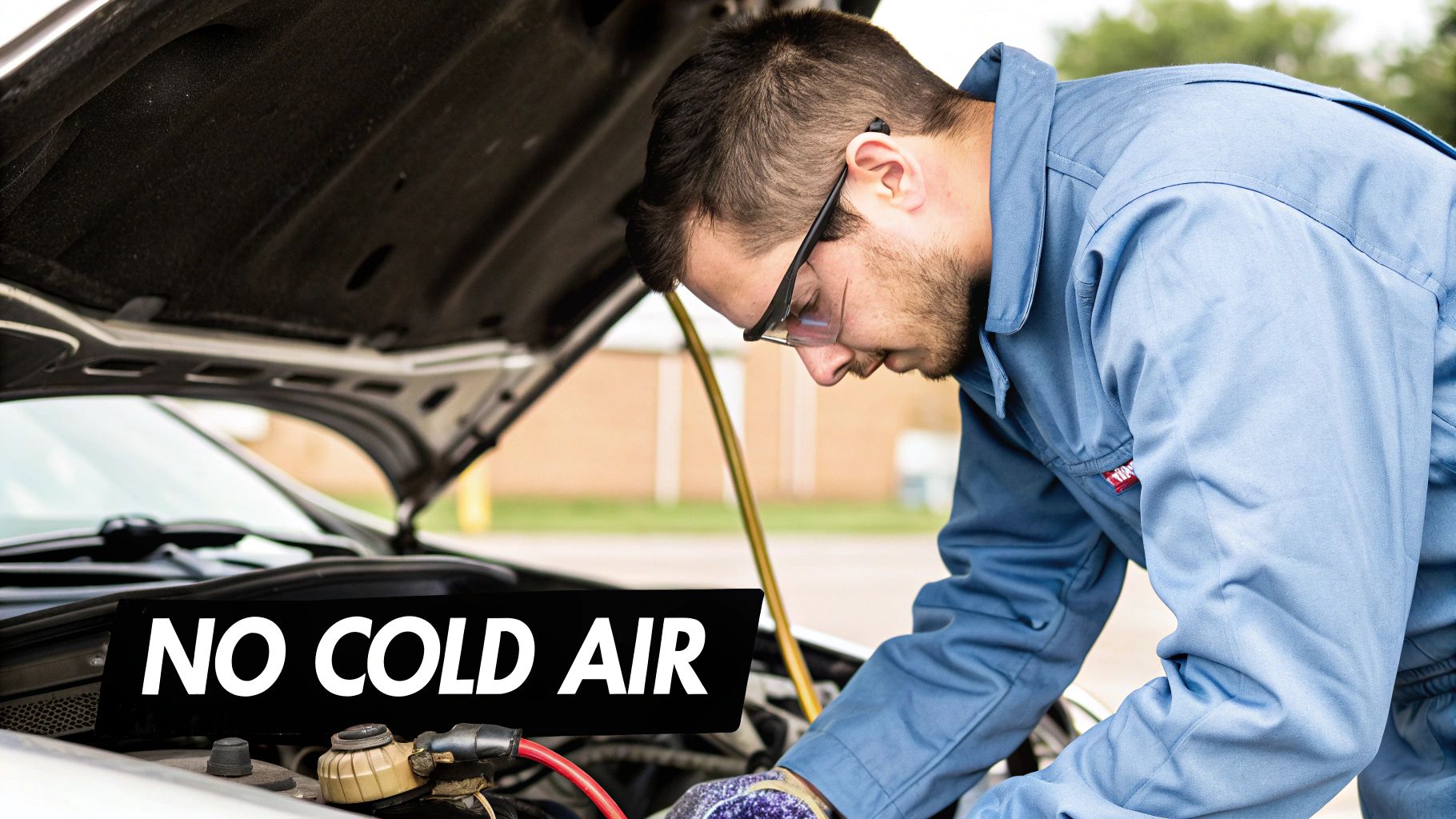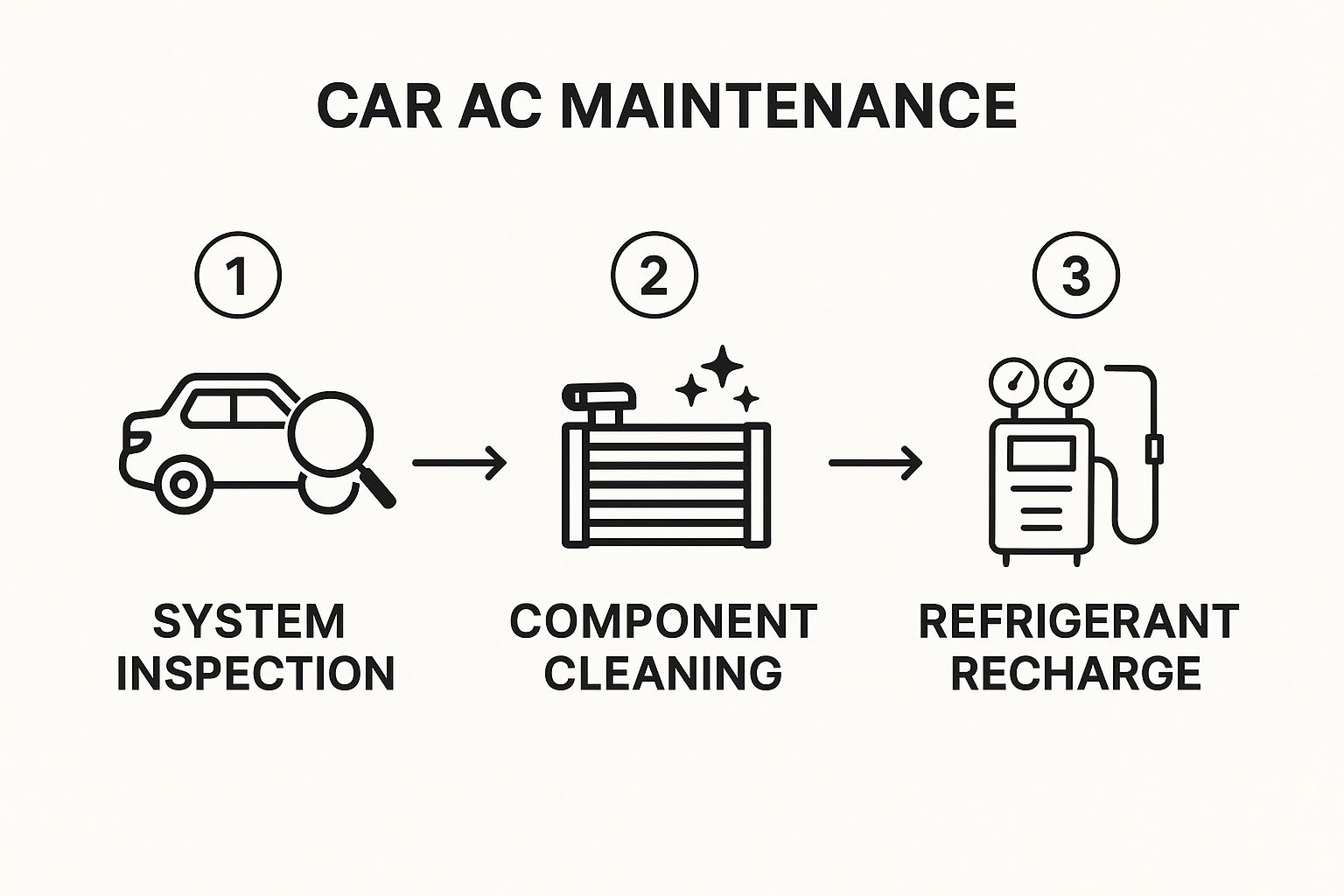Expert Car Air Conditioning Service Sandy – Keep Cool All Year
- coledem
- Aug 22, 2025
- 13 min read
When you're looking for a reliable car air conditioning service in Sandy, it's about more than just surviving a summer heatwave. A well-maintained AC system is your best friend for demisting a damp windscreen on a miserable UK winter morning. Simply put, it is needed for a comfortable and safe drive, no matter the season.
Why Your Car AC Is More Than Just a Luxury

It’s easy to think of a car's air conditioning as something you only flick on when the sun is blazing. But behind the scenes, it’s a complex system that’s constantly working to manage your car's interior environment and keep you safe. It does a lot more than just push cold air through the vents.
The system is a master at dehumidifying the air inside the cabin. That is why it's so brilliant at clearing a foggy windscreen when it's cold or chucking it down with rain. A healthy AC also improves your air quality by filtering out dust, pollen, and other pollutants, which means a healthier space for you and your passengers.
The Importance of Regular Maintenance
If you ignore your air con, its performance will slowly but surely decline. Little refrigerant leaks, worn components, or a build-up of bacteria can snowball from a minor nuisance into a seriously expensive failure. Regular checks are the best way to stop that from happening.
To keep things running smoothly, it helps to be aware of the various AC services available for your vehicle. Being proactive with maintenance brings some real benefits:
Improved Fuel Efficiency: When your AC system is struggling, it puts more strain on the engine, which in turn burns more fuel.
Preventative Care: Spotting a small leak or blockage early on can save you from a wallet-busting compressor replacement down the line.
Better Air Quality: A proper service includes cleaning or replacing the cabin filters that trap nasty allergens and pollutants.
Realising this is the first step towards smarter car ownership. Looking after your AC system isn't just about staying cool; it's about protecting the long-term health of your vehicle's climate control, making certain it’s ready to go whenever you need it.
This guide will walk you through everything a driver in Sandy needs to know about their car's air conditioning, from the basics of how it works to what a professional service actually involves. We'll build up your knowledge step-by-step, starting with the core parts that make the magic happen.
How Your Car's AC System Works

Ever wondered what’s actually happening behind the dashboard when you crank up the AC? Most people think it's about creating cold air, but it's much cleverer than that. Your car's air conditioning system is really a heat-moving machine. Its job is to pull heat from inside your car and dump it outside.
The magic ingredient making this happen is a special substance called refrigerant. This refrigerant flows through a sealed network of components, constantly changing from a gas to a liquid and back again. Understanding this cycle is the key to appreciating why a proper car air conditioning service in Sandy is so important. It’s a delicate, high-pressure sequence of physics.
Everything kicks off with the compressor, which you can think of as the heart of the whole system. Driven by a belt connected to your engine, it squeezes the refrigerant gas, which dramatically increases its pressure and temperature before sending it on its way.
The Key Stages of Cooling
From the compressor, this hot, high-pressure gas flows into the condenser. You'll find this part at the front of your car, usually right next to the radiator. Air passing over the condenser's fins as you drive (or from a fan) cools the refrigerant down, forcing it to condense back into a high-pressure liquid.
Next, this liquid passes through a receiver-drier or accumulator. This is the system's filter, and its job is to trap any moisture or tiny bits of debris that could cause serious damage. It’s a small but critical step for keeping everything healthy.
Now for the clever bit. The liquid refrigerant is forced through a tiny opening called an expansion valve or orifice tube.
This sudden drop in pressure as the liquid sprays through the valve makes it instantly and intensely cold. This is the moment of transformation—from a pressurised liquid to a freezing, low-pressure mist—that gives the system its cooling power.
This ice-cold mist flows into the evaporator, a component tucked away behind your dashboard. A fan blows the warm air from your car's cabin across the evaporator's fins. The cold refrigerant inside absorbs all the heat from that air, and what comes out of your vents is wonderfully chilled.
Having done its job and absorbed the heat, the refrigerant turns back into a gas and heads back to the compressor to start the whole loop over again.
Why This Matters for Your Vehicle
For that blast of cool air to work, every single part of this cycle has to be in top condition. A small leak, a blocked filter, or a tired compressor can bring the whole system grinding to a halt. It's no surprise that with our summers getting warmer, the global automotive HVAC market is predicted to grow at a CAGR of 6.3% between 2025 and 2032.
Comfort is no longer a luxury; it's an expectation. To get a better handle on the mechanics, you can read more about [what every driver needs to know about car air conditioning](https://www.krauseautos.co.uk/post/car-air-conditioning-explained-what-every-driver-needs-in-2025). This rising demand just goes to show how much regular, professional maintenance has become.
Signs Your Car AC Needs a Professional Service

Most car air conditioning systems don't just suddenly die. They usually give you little hints and whispers that trouble is brewing long before they pack it in completely. Spotting these early warnings is the key to getting a professional car air conditioning service in Sandy before a small niggle turns into a major, wallet-draining disaster.
The most obvious sign, of course, is warm air blowing from the vents. But often, the first clue is more subtle.
You might notice the air just isn't as cold as it used to be. It’s cool-ish, but it doesn't have that icy bite you crave on a sweltering summer day. This gradual drop in performance is a classic sign of low refrigerant, which usually means there's a slow leak somewhere in the system.
Another tell-tale sign is weak airflow. If you can hear the fan blowing its heart out but only a pathetic puff of air is trickling from the vents, something is blocked. It could be as simple as a clogged cabin air filter, or it might point to a bigger issue deeper inside the dashboard.
Listening for Trouble
Your ears are one of the best tools you have for diagnosing AC problems. A healthy system is nearly silent, so any new or unusual noises are a definite red flag. Keep an ear out for these sounds:
Rattling or Banging: A sudden rattle when the AC kicks in could mean the compressor's clutch is on its way out. It might also be a sign of loose mounting bolts or debris in the system.
Hissing: If you hear a persistent hissing sound that stops a few seconds after you switch the AC off, you’ve likely got a significant refrigerant leak. That's the sound of the gas making a swift exit.
Squealing or Grinding: A high-pitched squeal often points to a worn-out serpentine belt that drives the compressor. A deeper, more sinister grinding noise usually means the compressor itself is failing internally. That’s a serious problem.
An unusual sound from your AC is your vehicle's way of asking for help. Ignoring it can lead to compressor seizure, which is one of the most expensive components to replace in the entire system.
Unpleasant Smells and Puddles in the Cabin
Ever turn on your AC and get hit with a funky, damp smell, a bit like old socks? That’s a clear sign of mould and mildew growing on the evaporator core. It’s not just unpleasant; it's terrible for the air quality inside your car, especially if you have allergies.
You should also watch for any mysterious puddles of water inside the car, particularly in the front passenger footwell. Your AC system naturally creates condensation, which is meant to drip out onto the road via a drain hose. If that hose gets blocked, the water has nowhere to go but back inside your car, leading to soggy carpets and an ideal breeding ground for more mould.
To help you connect the dots, here's a quick guide to what these common symptoms might mean.
Diagnosing Common Car AC Problems
Symptom | Potential Cause | What to Do |
|---|---|---|
Air isn't cold enough | Low refrigerant (leak), failing compressor, blend door issue | Get a professional leak check and refrigerant service. |
Weak airflow from vents | Clogged cabin air filter, failing blower motor, blockage in the vents | Start by replacing the cabin filter; if that doesn't work, seek professional diagnosis. |
Musty or damp smell | Mould/bacteria build-up on the evaporator core | An anti-bacterial clean or 'AC bomb' treatment is needed. |
Strange noises (squealing, rattling) | Worn belt, failing compressor clutch, or internal compressor damage | Turn the AC off and have a mechanic inspect the system immediately to prevent further damage. |
Water leaking into the cabin | Clogged evaporator drain hose | The drain line needs to be professionally cleared to prevent water damage. |
Recognising these issues is the first step, but figuring out how to tackle them is the next. For a more detailed walkthrough, have a look at our guide on [how to fix car AC problems](https://www.krauseautos.co.uk/post/a-practical-guide-on-how-to-fix-car-ac-problems). Acting quickly is always the best way to secure a simple and affordable fix.
What to Expect During a Car AC Service
Booking your car in for an air conditioning service can feel like a bit of a mystery. You know it’s not working right, but what actually happens behind the workshop doors? A proper car air conditioning service in Sandy isn't just a quick top-up; it's a precise process designed to diagnose issues, clean the system, and get that cold air flowing again.
First, a technician will run a performance check. They'll measure the temperature of the air blowing from your vents and connect a special set of gauges to the system's high and low-pressure ports. This gives them an instant snapshot of your AC's health, telling them if the pressures are where they should be.
The Re-Gas and Leak Detection Process
After the initial checks, it's time to get the old stuff out. A technician will hook up a sophisticated recovery machine to safely remove all the old refrigerant from the system. This is what people often call a "re-gas," but it's much more involved than just adding more. The machine carefully measures how much refrigerant comes out, which is a massive clue as to whether you've got a leak.
Once the system is empty, the real diagnostic work begins with a vacuum test. The machine sucks all the air and, critically, any moisture out of the lines, creating a deep vacuum. It then holds this vacuum for around 20 minutes. If the pressure starts to creep back up, that’s the tell-tale sign of a leak that needs finding and fixing before anything else happens.
This process is a methodical workflow, moving from initial checks to the final recharge, making certain nothing is missed.

Each step is designed to restore your system's performance and catch any underlying problems before they get worse.
Final Steps and Quality Checks
If the system holds its vacuum and gets the all-clear for leaks, the technician will add a precise amount of fresh PAG oil. This special oil is absolutely needed for lubricating the compressor—the heart of the AC system—and keeping all its moving parts happy. Without it, the compressor would quickly burn out.
Finally, the recovery machine refills the system with the exact weight of new, clean refrigerant recommended by your car's manufacturer. This isn't a guessing game; too much or too little refrigerant will lead to poor cooling and can even damage components. Once refilled, a final performance test confirms that the air coming from your vents is ice-cold, just as it should be.
The UK's automotive AC market is growing steadily, with the compressor segment alone expected to expand by around 3.5% each year until 2035. This shows just how complex these systems have become, making professional servicing more important than ever. This rising demand naturally influences service prices, and you can explore the current UK car AC service cost in our detailed guide.
What Type of Gas Does My Car AC Use?
Think of the refrigerant in your car's air conditioning as the magic ingredient that makes the cold air happen. For a long time, the go-to gas for this job was R134a. If your car rolled off the production line before 2017, it's almost a certainty that this is what's circulating through its AC system.
But times have changed. As we've become more aware of our environmental footprint, the spotlight turned on refrigerants. The problem with R134a is its high Global Warming Potential (GWP) – a fancy way of saying it’s really good at trapping heat in the atmosphere if it escapes. This prompted a major shift in regulations.
Enter the new standard: R1234yf. Since 2017, every new car sold in the UK has to use this much more eco-friendly gas. It does the same job as the old stuff, but its GWP is over 99% lower, which is a huge win for the planet.
Finding Out Which Refrigerant Your Car Needs
So, how can you tell which gas your car needs for its next car air conditioning service in Sandy? Thankfully, it's usually straightforward. Pop the bonnet and have a look around – you'll often find a sticker near the latch or on the AC compressor itself, clearly marked with either "R134a" or "R1234yf".
Getting this right is absolutely critical. These two gases aren't friends; they can't be mixed and work at different pressures. Putting the wrong one in won't just leave you with lukewarm air, it can lead to some seriously expensive damage to the delicate parts of your AC system. Any professional garage will double-check this before they even think about hooking up their equipment.
Using the wrong refrigerant is like putting diesel in a petrol car; the system is simply not designed for it. This is why a qualified technician will never mix the two or attempt a conversion without the proper, specialised equipment.
This difference is also a key reason why you'll see a price variation in AC servicing. The newer R1234yf gas is a lot more complex and costly to make than its older cousin, and that cost naturally trickles down to the final price of a re-gas.
Refrigerant Comparison R134a vs R1234yf
To make things clearer, let's break down the key differences between the two main refrigerants you'll find in cars on the road today.
Feature | R134a | R1234yf |
|---|---|---|
Typical Vehicle Age | Pre-2017 models | 2017 and newer models |
Global Warming Potential | High (1,430) | Very Low (less than 1) |
Flammability | Non-flammable | Mildly flammable |
Service Cost | Lower | Higher |
As you can see, while R1234yf is better for the environment, it comes with a higher service cost and different handling requirements because of its mild flammability. This is why it’s necessary to have your AC serviced by technicians who are trained and certified to work with both systems safely.
How to Choose the Right AC Mechanic in Sandy
Finding the right person for your car's air con service in Sandy isn't just about a quick search online. It’s a decision that directly impacts the quality of the work and how long your AC system will last. You're looking for that sweet spot: technical know-how, straight-talking communication, and a solid local reputation.
First, check their qualifications. Any technician handling refrigerants legally must have an F-Gas handling certificate. This isn't just red tape; it's your proof that they’re properly trained to manage these substances safely and effectively. It shows they know the right way to do the job without cutting corners.
It's also worth asking if they have experience with your specific make and model. While all AC systems work on similar principles, a mechanic who knows the common quirks of a Ford Focus versus a BMW 3 Series can pinpoint a problem far more quickly and accurately.
Evaluating a Garage's Credentials
Once you've got a couple of names, it's time to do a little homework. Customer reviews are a brilliant window into what other drivers in Sandy have experienced. Look for consistent themes – things like fair pricing, clear explanations of the work needed, and finishing the job when they said they would.
Before you give anyone the go-ahead, always ask for a detailed quote. Make certain it breaks down all the costs: labour, parts, and the VAT. A good, honest mechanic will have no problem walking you through what’s included, so you know exactly where your money is going.
Requesting an itemised quote protects you from surprise bills. It also gives you a proper way to compare different garages, making certain you’re getting good value for a professional job.
Car air conditioning has become surprisingly complex over the years, with modern systems packed with advanced sensors and variable compressors. This means a qualified service centre needs not only skilled technicians but also the right diagnostic tools. To get a sense of these industry shifts, you can read the latest research on the automotive air conditioning market. Choosing a garage that invests in up-to-date kit is always a smart move.
You need to feel confident in your choice. For some more general tips, have a look at our guide on how to [find a trusted car repair garage near you](https://www.krauseautos.co.uk/post/find-a-trusted-car-repair-garage-near-me). A little research now means peace of mind and a perfectly chilled car later.
It’s perfectly normal to have a few questions about your car's air conditioning. Let’s be honest, it’s one of those things we don’t think about until it stops working on a sweltering day! Getting the right information helps you look after your car properly and keeps you cool when it counts.
Here are some of the most common questions we get asked at the garage.
How Often Should I Get My AC Serviced?
This is probably the number one question we hear. As a rule of thumb, we recommend a full professional AC check and service every two years. Think of it like a regular health check-up for your car's cooling system – it’s all about catching minor issues, like tiny refrigerant leaks or early component wear, before they turn into expensive, system-wide failures.
What's the Difference Between a Re-Gas and a Full Service?
People often ask this, and it’s a critical distinction. A simple "re-gas" is just a top-up of the refrigerant gas, which might be a temporary fix but doesn't address the underlying reason why the gas was low in the first place.
A full car air conditioning service in Sandy, in another way, is a complete overhaul. We don’t just top it up; we safely remove all the old refrigerant, create a deep vacuum to check for leaks, and then add fresh lubricant oil and the precise amount of new refrigerant. It’s the proper, professional way to do it.
Can I Do Any AC Maintenance Myself?
Absolutely! While the technical stuff needs specialist equipment, there are a couple of simple things every car owner can do to help. Changing your cabin air filter regularly is a great start; it's usually straightforward and makes a huge difference to airflow and the quality of the air you breathe.
Another fantastic tip is to run your AC for about 10-15 minutes at least once a week, even in the middle of winter. This simple habit keeps the refrigerant and lubricant circulating, which stops the system's seals from drying out, cracking, and causing leaks down the line.
Running your air conditioning regularly, regardless of the season, is one of the most effective ways to maintain its health. It makes certain all the moving parts stay lubricated and ready for when you need them most.
By combining these simple habits with a professional check-up every couple of years, you can keep your air conditioning system in top-notch condition for the long haul.
For a complete and professional car air conditioning service in Sandy, trust the experts at Krause Autos. We offer free performance checks and handle both R134a and R1234yf systems to keep you comfortable all year round. Find out more about our AC services and book your appointment today.





Comments